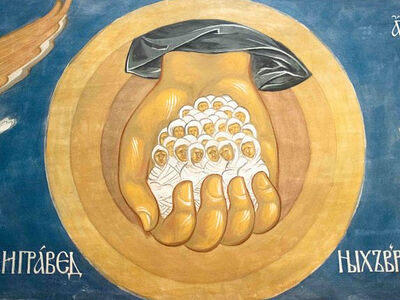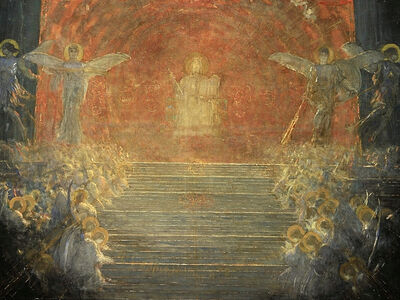Revelation: Removing the Veil
This revelation was given by God to the Apostle John because we needed to know it.

If Christ Is With Us, Death Is Defeated
The book of Revelation teaches us a lot, especially when we begin to carefully delve into its words, when we see how Christ holds the world in His hands and acts with wisdom in all things.

Now we turn to the epistle to the angel of the Church of Thyatira:
And unto the angel of the Church in Thyatira write; These things saith the Son of God, Who hath his eyes like unto a flame of fire, and his feet are like fine brass (Rev. 2:18). Do you remember how the Apostle John saw Christ? His feet were like fine brass, a precious metal, and his eyes like flames of fire. He saw Him in such striking glory. Christ asks to write to the bishop about the following: I know thy works, and charity, and service, and faith, and thy patience, and thy works; and the last to be more than the first (Rev. 2:19). First the Lord tells him about good deeds—this bishop had love, faith, patience, and served sincerely. His last works were greater than the first. Notwithstanding I have a few things against thee, because thou sufferest that woman Jezebel, which calleth herself a prophetess, to teach and to seduce My servants to commit fornication, and to eat things sacrificed unto idols (Rev. 2:20). You see, God speaks very directly and sincerely to man. God doesn’t play tricks on us and doesn’t laugh at us. God doesn’t act like we do: “Should I tell him or not? Maybe he’ll misunderstand me. I hope he doesn’t think anything bad about me, doesn’t get offended.”
God speaks directly. Of course, only God can do this, not us, because we don’t see the soul of another as God sees it. But when the Church speaks about something, for example, it doesn’t allow heretics to commune, it doesn’t allow us to pray together with heretics, it calls something a heresy or delusion, then it speaks about it very definitely. And we start arguing that that it didn’t need to be said, that it’s better to do everything with love, it’s better not to tell someone, so as not to hurt him, that God is for everyone…
Such manifestations of love, of course, aren’t real. We think we have love by behaving this way. But deeds and actions that harm another can’t be called love.
Just like a doctor must tell you the truth out of love, the Church also diagnoses spiritual issues for the sake of healing with sincerity and love. It is important to address problems honestly in order to help someone. For example, when faced with a Freemason seeking communion, it is necessary to explain the incompatibility of Masonic beliefs with the Church. Similarly, a Catholic man who loved Orthodoxy but struggled to leave Catholicism was urged to acknowledge his separation from the Church. Despite initial resistance, these difficult truths ultimately lead to salvation. The Church emphasizes the importance of being part of the One, Holy, Catholic, and Apostolic Church, rejecting the idea of multiple conflicting churches. Ultimately, facing uncomfortable truths is necessary for spiritual healing and growth. However, the truth is what ultimately led to his transformation. If the Elder had simply reassured him and allowed him to continue as he was, nothing would have changed. The man faced suffering and illness but ultimately accepted the truth, got baptized, and embraced Orthodoxy. Today, he serves as an Orthodox priest in Rome, Italy, dedicated to his spiritual work. He shares his journey as a testament to the power of truth.
The reality is that sometimes the truth is difficult to accept. You cannot simply tell someone to live however they please, especially if they are engaging in harmful behaviors. Offering false comfort or approval only leads to further pain and turmoil. It is crucial to address the truth, even if it is uncomfortable, to guide others towards the right path.
God always speaks the truth to us, even when it is challenging. He reveals both the good and the areas where we need to improve. It is important to recognize and address our shortcomings, as ignoring them only leads to further harm. Just as in the case of the bishop mentioned in the book of Revelation, we must confront and correct any false teachings or behaviors within ourselves and the Church.
False prophets and heresies have always existed within the Church, leading people astray with deceitful teachings. It is essential to discern between true spiritual gifts from the Holy Spirit and deceptive practices influenced by evil forces. The path of repentance and correction is always available, but it requires humility and a willingness to acknowledge and address our faults. The woman or heresy was given time by the Lord to repent, but she refused to give up her sins. Fornication is not just a physical sin but also a spiritual separation from God. Man is meant to be united in marriage with Christ, who desires to be the Bridegroom of our soul.
When a person indulges in sin, it is like spiritual fornication. They stray from God and enter into a union with sin and Satan. The consequences of such actions are severe, as mentioned in Revelation 2:22. The Lord will leave them to face the tribulations brought on by their own deeds.
Sin is destructive to the soul, leading to spiritual death. It withers the soul and distances it from God. Every sin brings about death, not in a physical sense but in a spiritual one. Sin destroys everything within a person, both body and soul.
Christ, who searches the reins and hearts, will judge everyone according to their deeds. This shows continuity between the Old and New Testaments, proving that Christ is the un-incarnate Word of God. He will reward or punish based on one’s actions.
This article will continue in the next installment.
Source link

